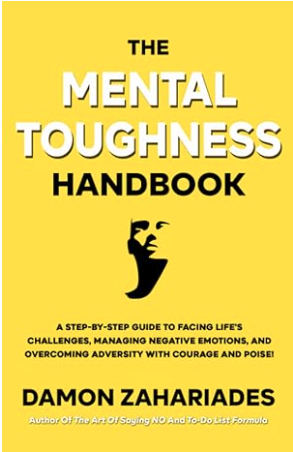INSIDER: The Mental Toughness Handbook
Jude Enajero, MBA/MSIS Candidate
The challenges we face in today’s world seem more daunting than ever. From the COVID-19 pandemic to political unrest and social upheaval, it's easy to feel overwhelmed and powerless in the face of so much uncertainty and adversity. However, developing mental toughness can be a powerful tool for navigating these challenges and coming out stronger on the other side.
In The Mental Toughness Handbook, Damon Zahariades provides practical advice and strategies for building resilience, perseverance, and self-discipline, skills that are more important than ever in the current climate. By developing mental toughness, we can learn to overcome fear and self-doubt, stay focused on our goals, and navigate the complexities of the world around us. In this Insider, we'll explore the key concepts of The Mental Toughness Handbook and how they can be applied to the challenges we face today, helping develop the mental fortitude needed to thrive in even the most difficult of circumstances.
THINK POINT #1: Practice Self-Awareness
Self-awareness is a crucial component of building mental toughness. It involves understanding thoughts, emotions, and behaviors as well as recognizing our strengths and weaknesses. Self-awareness allows us to identify limiting beliefs, regulate emotions effectively, and cultivate a sense of purpose and direction. Developing self-awareness can also help build stronger relationships with others. When you understand your own emotions and behaviors, you are better able to empathize with others and understand their perspectives. This can lead to better communication, stronger teamwork, and more effective leadership.
Strategies for developing self-awareness include mindfulness practice, journaling, seeking feedback, and reflecting on experiences. By developing self-awareness, we can build mental toughness and achieve our goals.
THINK POINT #2: Embrace Resilience
Resilience is a critical skill for success in today's fast-paced and constantly changing world. It allows us to adapt to changing circumstances, recover from setbacks, and persevere through challenges. Building resilience is an essential component of mental toughness, as it enables us to approach difficult situations with a positive outlook and a sense of purpose.
To develop resilience, we must reframe failure as an opportunity to learn, build a support network, and practice self-care. By seeing failures as opportunities to improve, we approach challenges with a growth mindset. Building a support network provides us with the motivation we need to keep going, while practicing self-care allows us to maintain our energy and focus on stressful situations. Taking care of our physical and emotional needs includes getting enough sleep, healthy eating, regular exercise, and taking time for relaxation and reflection.
Developing resilience is a vital component of building mental toughness. It’s important to develop a growth mindset, to view challenges as opportunities for learning and growth, and to focus on progress rather than perfection.
THINK POINT #3: Practice Perseverance
Perseverance is a fundamental aspect of developing mental toughness, and it's essential for achieving our goals. To practice perseverance, we need to have a clear understanding of our goals and break them down into smaller, more manageable tasks. By setting deadlines for completing each task, we can stay motivated and focused on our objectives. It's also crucial to maintain a positive and growth-oriented mindset when facing obstacles or setbacks. We should view challenges as opportunities to learn and grow, rather than as failures. This growth mindset can help us maintain our motivation and stay on track towards our goals.
THINK POINT #4: Cultivate Self-Discipline
Self-discipline is the ability to control one's thoughts, emotions, and actions to achieve a particular goal. To build self-discipline, it's essential to set clear, specific, and achievable goals and then break them down into smaller tasks. It's also crucial to eliminate any distractions that could derail progress towards these goals. Developing positive habits that align with goals and practicing self-control are other strategies to reinforce self-discipline. Consistent practice and persistence can help develop this skill, leading to greater success and fulfillment.
Conclusion
The Mental Toughness Handbook is a valuable resource for anyone looking to enhance mental resilience and achieve peak performance. Its insights and strategies are particularly applicable to the real estate industry. By embracing challenges as opportunities for growth and learning, professionals in the industry can fortify their mental toughness, improving their prospects of success.
. . . . . . . . . . . . . . . . . . .
Recommended Reading
Zahariades, Damon (2020), The Mental Toughness Handbook, Independently published: Coppell, Texas.
. . . . . . . . . . . . . . . . . . .
About the Author
Jude Enajero, MBA/ MSIS Candidate
Baylor University
Jude Enajero is an MBA Finance/MSIS candidate at Baylor University experienced in excel modeling, financial statement analysis, risk modeling, project management, and market evaluation. He has four years of experience in supporting the implementation of effective debt and equity program for both private and listed companies and working in cross functional teams with ability to develop and deliver quality presentations. Jude earned his Bachelor of Finance (Honors) degree from the University of Lagos, in Lagos, Nigeria.
